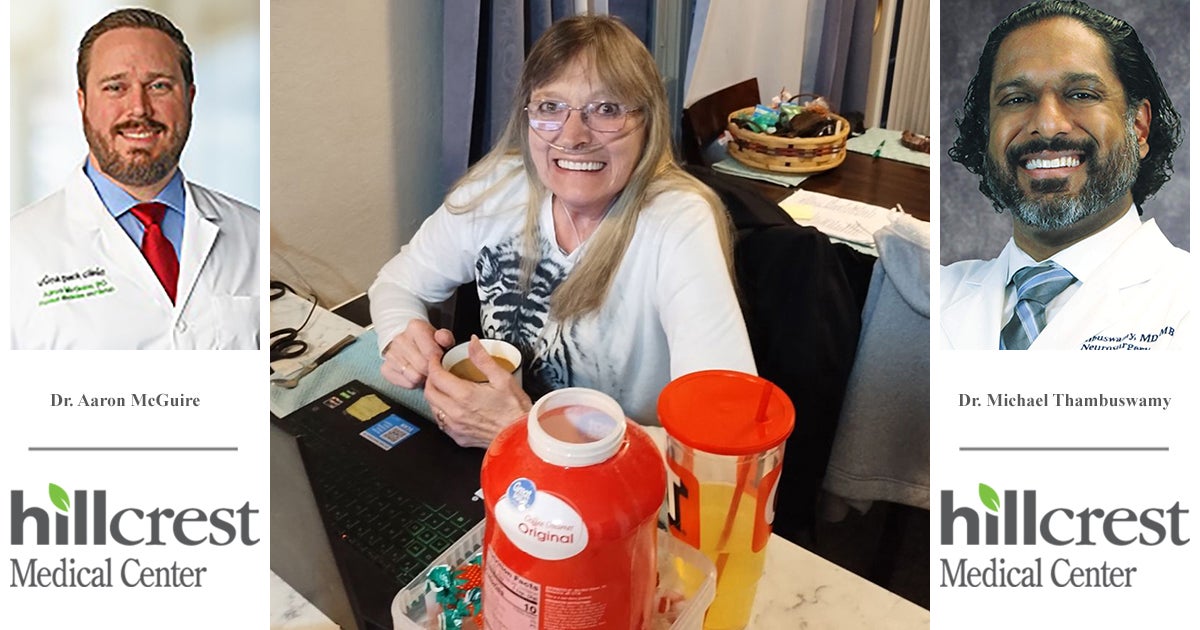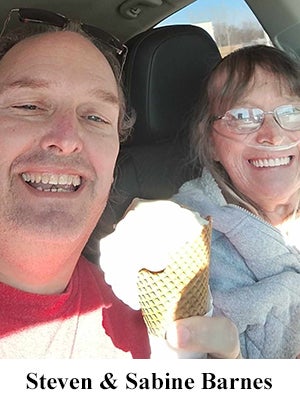
Over the past decade, Sabine Barnes has entered many hospitals’ front doors. Most recently, the caregivers at Hillcrest Medical Center (HMC) and the Kaiser Rehabilitation Center have given her and her family hope for a brighter future.
“We have been to many hospitals and very few of them do it as well as HMC,” said Sabine’s daughter Jenny. “Especially when Mom was having difficulty breathing, everyone acted so quickly and efficiently – it was just great!”
Originally from Germany, the 63-year-old immigrated to the United States and settled in Arab, Alabama. A former smoker, Barnes was first diagnosed with chronic obstructive pulmonary disease (COPD), a group of diseases that cause airflow blockage and breathing-related problems. Soon afterward she was diagnosed with lung cancer.
Strange behaviors
Three years later, Barnes started to exhibit unusual behaviors to her family.
“One night we were cutting up photographs to put in an album,” recalled Jenny. “Mom had a pair of scissors in her hand and as she cut a photograph, she started laughing. ‘Are those scissors funny to you, Mom?’ ‘Yes, and I don’t know why,’ she said. Another time she drove to the bank like she does every week. She parked the car and then called Dad. ‘I don’t remember why I am at the bank, and I don’t know how to get home.’”
After a scan at an Alabama hospital was inconclusive, her family took her to a medical center in Tennessee where a swollen mass was found in her brain. The doctors believed that her lung cancer had metastasized in the front temporal lobe of her brain, an area believed to play an important role in processing emotions, language, auditory information and visual perception.
Barnes underwent surgery to remove as much of the tumor from her brain as possible, despite the significant swelling. After the surgery, bouts of radiation and chemotherapy helped reduce the tumor.
For the next seven years, her cancer was in remission. During this time, the family noticed a change in her demeanor.
“After her brain surgery, Mom was much happier,” recalled Jenny. “It was like her brain was rewired in a positive way. She was more open to new ideas, she laughed more and liked staying busy doing things. It seems weird to say that she had a positive outcome from a tumor, but she's happier now than she used to be.”
An unexpected return
During the seven years in which her cancer was in remission, the family moved to Tulsa, Oklahoma and transitioned her care to Hillcrest Medical Center. That’s where doctors found another mass in her brain, one that was roughly the size of a lemon.
Barnes had also developed aphasia, a communication disorder that occurs when the parts of the brain responsible for language are damaged. This damage can be caused by a stroke, traumatic brain injury, a brain tumor or other neurological conditions.
Some individuals can have mild aphasia and struggle with finding words or forming sentences, while others may have severe aphasia and be completely unable to communicate verbally or in writing.
Barnes underwent successful surgery to remove the brain tumor by Michael Thambuswamy, MD, a physician associated with Hillcrest Medical Center and Oklahoma Spine and Brain Institute. After the surgery, Barnes recovered at Hillcrest Medical Center and then later at the Kaiser Rehabilitation Center under the care of Aaron McGuire, DO.
“After her brain surgery, Mrs. Barnes needed assistance for basic functions like getting dressed, using the bathroom, transitioning from sitting to standing, and walking” said Dr. McGuire. “During inpatient rehabilitation, a patient will work with therapists for three hours a day. It’s a lot more intense than outpatient rehabilitation, but you get more done in less time.”
“The staff took such great care of our family,” recalled Jenny. “Not only did they take care of my mom, they also took care of my dad. At the time, Mom didn't talk well because of her aphasia, so Dad never wanted to leave her side.
“When the staff noticed their room had simple visitor chairs, they wheeled in a pull-out bed, complete with comfortable pillows and blankets. Whenever it was mealtime for Mom, a guest tray was always delivered to Dad.”
The family had high praise for the staff who cared for Barnes throughout each day. At each shift change, two nurses met in her room and talked about her care.
At that time, Barnes’s aphasia caused her to answer only in single words, often the word "yes." To encourage verbal interactions with her, the nurses gently used the word in their conversations during patient rounds.
“Did you like your dinner, Mrs. Barnes?”
“Yes.”
“Do we look pretty today?"
“Yes,” she answered while smiling. “The nurses sure knew how to make Mom smile and feel better,” said Jenny.
Another moment during her stay in the Kaiser Rehabilitation Center delivered a lot of joy to the Barnes family.
“Mom was still answering our questions with ‘yes’ or other one-word answers when a therapist came into her room,” recalled Jenny. “The therapist asked about her language skills. When my dad explained her symptoms, he also mentioned that Mom is German. The therapist immediately asked Mom questions in fluent German. To our great surprise, Mom answered back in German with complete sentences!”
“We have an occupational therapist at Kaiser Rehabilitation Center with a German background and who speaks a lot of German,” explained Dr. McGuire. “Early on, Mrs. Barnes did better by speaking in German, but later she was replying and answering most questions well in English. What the brain does can be very interesting.”
According to a study of bilingual patients with aphasia, one or both languages may be affected by the condition, but there’s no way to know whether the native or second language will be dominant until it is spoken.
“At least now we have a backup in case English doesn't work out,” said Jenny. “If we get stuck in the future, we can use Google Translate on our phone to communicate better with her!”
A couple of months later, Barnes went back into surgery so Dr. Thambuswamy could install a shunt to funnel excess fluid from her skull into her abdomen. Draining the fluid will lower the risk of further brain swelling.
Looking forward
 The Barnes family was pleased to get the news that Sabine’s cancer is now in remission. She will undergo tests every six months to watch for any signs that it may return, but for now, she can concentrate on expanding her language skills despite the aphasia.
The Barnes family was pleased to get the news that Sabine’s cancer is now in remission. She will undergo tests every six months to watch for any signs that it may return, but for now, she can concentrate on expanding her language skills despite the aphasia.
“We are forever grateful that Mom’s care and our lives were blessed with such a wonderful team,” said Jenny. “I feel like we moved to Oklahoma for more reasons than just family. My mom was meant to find Hillcrest Medical Center. They have put in more effort in her and our family's care than any other place we have been.”
Sabine’s husband echoed those sentiments.
“I appreciated the teamwork between the doctors, nurses and all the staff,” said Steven. “We were especially pleased with the time and explanations from Dr. Thambuswamy. He gave us all the information we needed plus the good and the bad possible outcomes. Somehow, he was able to talk us through it all with no added fear.”
“Mom is not one to show emotion very often, but even she would smile her big, beautiful smile every time Dr. Thambuswamy walked into the room,” recalled Jenny.
“The whole team worked so well together to get the right things done the right way,” Steven continued. “We are so appreciative of all they did, including the nurses and therapists who make visits to our home.”
Sabine is enjoying being home recuperating from her surgery and therapies and watching TV with her husband and her Chihuahua. She is also spending more time painting, one of the hobbies she likes.
“Mom is now back to her full faculties again,” said Jenny. “She’s talking and walking great, aside from the previous issues related to COPD. I check with Dad every day to ask how she’s doing, and he usually answers me with ‘she’s getting better every day!’”
For more information about the Kaiser Rehabilitation Center at Hillcrest Medical Center, visit our web page.
